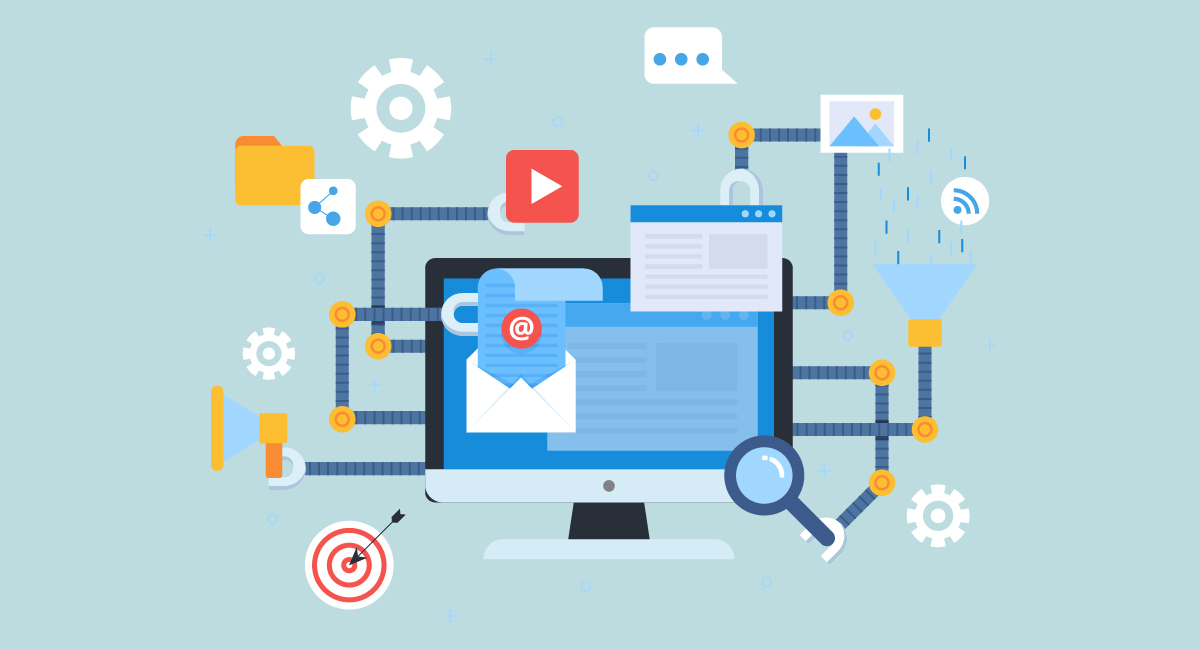Marketing automation is at the center of some of the coolest and most useful technologies available to marketers today. However, the one thing that can benefit marketing automation the most can also be its downfall: the people who run it.
This blog post will help you understand the key reasoning behind marketing automation, what it can—and can’t—do for your business, and a few reasons to consider utilizing this technology. Before we get started, let’s define our key term.
What is Marketing Automation?
Marketing automation is a software platform used by marketers and organizations to automate tasks in order to more effectively market to potential clients on multiple channels. A marketing automation platform is used to engage with sales leads as they progress down the funnel and ultimately become customers.
Let’s be clear: marketing automation is a platform and does not include the strategy or the labor, mainly in the form of content development, that is required to be effective. This is where your highly-skilled team of marketing and content professionals comes in. Often, this team is augmented by outside contractors or marketing consultants.
Related Page: Marketing Automation Platform & Consulting
What Marketing Automation Can Do
As we now know, marketing automation is based entirely on the platform that is utilized. While there are some very expensive tools out there like HubSpot or Salesforce, it’s also important to keep in mind that they offer features that the “average” small- to medium-sized business might not need.
One of the central features of any effective marketing automation tool is the ability to segment and automate emails triggered by actions taken on the website or engagements through other channels (e.g. social media). Other features of an effective marketing automation platform include:
- Email Marketing
- Marketing Workflows (based on actions or inactions)
- Customer Relationship Management (CRM)
- Campaign Tracking
- Landing Pages
- Forms
- Social Media Listening & Planning
Here’s an example: let’s say I visit your website and sign up for an offer on your landing page. An effective marketing automation platform would then add me to the hot lead list and deliver different types of content to gather more information about me (am I a qualified or unqualified prospect, partner, etc.). That information should then help segment me into the appropriate lead category and keep me engaged based any actions I take, such as engaging with your company on social media or viewing specific pages on your website.
This is a brief example of how marketing automation can be utilized to automate engagement and push a lead down the funnel.
Related Download: Landing Pages Go-To Guide
What Marketing Automation Can’t Do
As I briefly touched on earlier, one of the biggest points of consideration for marketing automation isn’t necessarily the tool you use, but the strategy that accompanies it. Pursuing marketing automation without a sound strategy is akin to trying to drive a new Ferrari with only three tires and the handbrake engaged.
Many marketing automation tools have comparable functions, so choosing the tool is often the biggest challenge for businesses, but make sure you take the time to ensure you have the right strategy in place if you want to make the most use of the platform. Marketing automation strategy should be the first thing to consider before viewing different tools.
Who is Marketing Automation For?
While marketing automation can be utilized for virtually any size or type of company, often the companies that benefit the most have the following:
- Quality traffic to the website, but minimal engagement
- Multiple disconnected marketing tools in place (i.e. an email marketing provider, a separate landing page tool, a CRM tool, etc.)
- Great leads but no organized way of keeping them all straight
- Inaccurate or no campaign tracking
What we’ve found is that marketing automation can be especially useful for B2B companies, given that these companies often require longer sales cycles and more touchpoints on the road from lead to sale. Marketing automation can track these cycles and determine ROI on campaigns, ensuring that your marketing dollars go to good use.
Why Consider Marketing Automation?
If you own or operate a business that has problems with keeping track of marketing leads or taking those leads and converting them to sales, marketing automation could be a powerful new asset for you. By utilizing a great platform and sound strategy, you will see great improvements in the number of leads who convert and in tracking the effectiveness of your marketing efforts.
While marketing automation is not for all businesses, many find that the benefits far outweigh the small investment.





